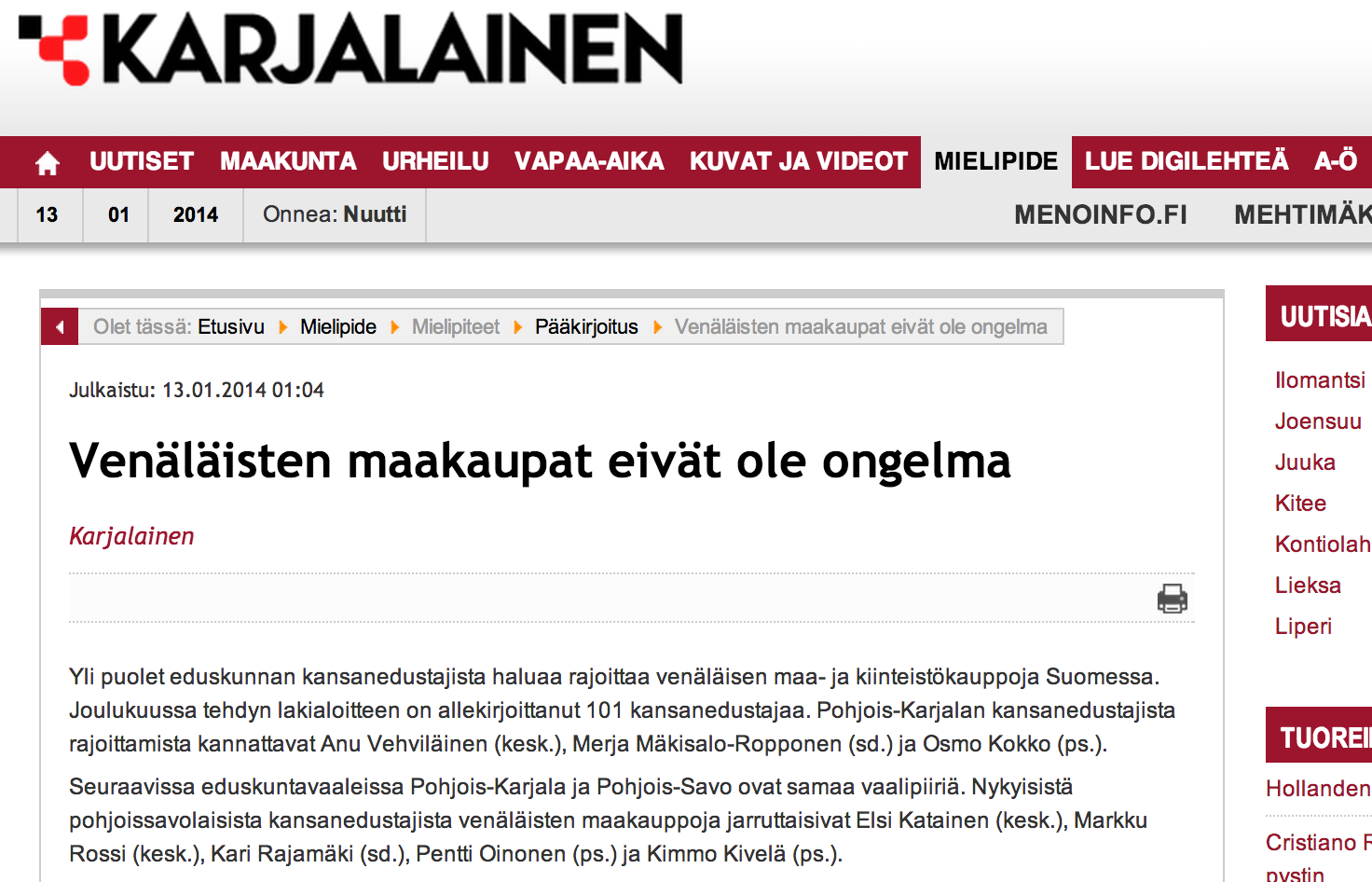In a country like Finland, which has a small migrant population compared with other European countries, intolerance and xenophobia usually reveal themselves as déjà vu. One of these real illusions came in the form of a draft bill in parliament that aims to prohibit real estate purchases by Russians, according to Joensuu-based daily Karjalainen.
The same fear-mongering to incite nationalism is by some Finnish MP during an election year is no different from what we saw recently in the United Kingdom, when Prime Minister David Cameron warned that 250,000 Romanians and Bulgarians were going to swarm to the country.
Home Secretary Theresa May added fire to Cameron’s warnings by claiming that Britain was powerless to stop tens of thousands of Bulgarians and Romanians from moving to the UK in 2014.
When January 1 came, only a few dozen arrived, according to Al Jazeera.
Read full story (in Finnish) here.
The draft bill already has the backing of 101 of 200 MPs.
According to Karjalainen, 400-500 real estate purchases are made annually by Russians in Finland, 20-30 in Eastern Finland alone.
One of the arguments used by those in favor of the draft bill is that it would curtail money laundering and is justifiable since Finns cannot buy land in Russia.
While they have a good point, the bill would hurt us since it would keep alive old suspicions about our eastern neighbor.
If the draft bill gets approval and becomes law, non-European Economic Area (EEA) citizens would have to be residents of Finland for five years in order to purchase real estate.
If we look at some of the MPs that are in favor of such a bill, we’ll quickly notice that they are the same politicians that are against refugees, cultural diversity and like to use the word “fatherland” in every other sentence.
Some of these MPs are the ones that want to demote the Swedish language to elective status at schools arguing that it would pave the way for more Finns to study the Russian langauge.
If these politicians are fueling our age-old suspicion of Russians with such a bill, why would more people be inclined to study such a language? Certainly favorable attitudes of a country play an important role.
For some, who have lived in this country for a long time, understand that present plans to curtail real estate purchases by Russians is a flashback to the days of the Restricting Act of 1939 (law 219/1939), which prohibited foreigners from owning real estate and acquiring a majority stake in Finnish companies.
The Act, which was in force until 1992, prohibited foreigners from owning shares in key sectors of the economy such as forestry, securities trading, transportation, mining, real estate and shipping.
Suspicion and xenophobia of the outside world was and still is very real. In the early 1980s I was handing a petition with a group of non-Finnish citizens to some MPs in parliament. The petition demanded greater rights for migrants in Finland. A common guest at such an event with foreigners was Police Chief Olli Urponen (1983-97). I once asked him why Finland had such a restrictive policy towards foreigners.
He responded: “To keep criminals out of Finland.”
This was the response of the police chief of a country that saw over 1.2 million of its countrymen emigrate between 1860 and 1999.
The very attitude, that the outside world is a dangerous place full of suspicious people, is how Finland saw the world during most of the last century.
Apart from having a law that curtailed foreign investment to the country up to the mid-1990s, official Finland did everything possible to hinder as much as possible foreigners from moving to the country.
The fact that it took Finland 65 years after independence to have in force in 1983 its first aliens act reveals how the country saw migrants and cultural diversity.
That same attitude persists today in too many circles and we have no-one else to blame than ourselves. We should teach more tolerance and less hatred of people who are different from us at schools and our homes.
If parliament passes a law that prohibits Russians from buying land in Finland, it won’t be a coincidence.


Don’t you think that current events in Ukraine by Russia and previously in Georgia warrant certain caution towards Russia — at least as long as Finland is not a member of NATO?
PS voter
Please explain exactly how the policies of a foreign government in any way justify discriminating against its citizens abroad. Should this discrimination apply to all of those citizens, or only to those who support that government and its policies?
To what extent would it be acceptable to restrict your rights in other countries, for example because the Finnish government continues to outlaw gay marriage?